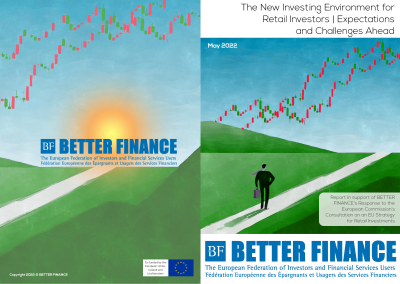 Over the last two years, health-related restrictions and economic shutdowns had unforeseen effects on European capital markets. An increase in disposable income available for EU households to invest, and at least four and a half million[1] previously inactive EU savers now investing in the real economy and trading in financial instruments, has created a new generation of “retail” investors in the EU.
Over the last two years, health-related restrictions and economic shutdowns had unforeseen effects on European capital markets. An increase in disposable income available for EU households to invest, and at least four and a half million[1] previously inactive EU savers now investing in the real economy and trading in financial instruments, has created a new generation of “retail” investors in the EU.
What’s more, is that these developments came on the back of increased investor activism (and interest in shareholder engagement) and in the wake of disruptive FinTech business models that make investing a much more attractive and accessible proposition for EU households, bringing them closer to capital markets. That being said, the exercise of shareholder rights unfortunately still remains very challenging, while the investor protection framework (product suitability rules, transparency, disclosures, etc.) remains inadequate and requires reforms.
This increased participation of “retail” investors in capital markets is very welcome in times of market turmoil, since their “contrarian” investing behaviour can offset the impact of institutional investors selling their assets, and thus flatten the corresponding illiquidity curve. Thus, in March-April 2020, retail investors provided stable and much-needed funding for the recovery of the EU economy.
One of the stated aims of the Capital Markets Union (CMU) is to “strengthen the link between savings and growth”, and since “households are the principal net savers in the economy”, the CMU project looks to “boost retail investments into capital markets and enhance individual confidence”.
It is therefore key to seize this once-in-a-generation opportunity, create an optimal investing environment, and ensure that EU households do not withdraw from capital markets. To this end, EU authorities must address many shortcomings, such as further improving the currently inadequate minority shareholder rights, ensuring better supervision of broker practices and transparent trading, increasing product accessibility for “retail” investors also across borders, and delivering bias-free retail financial services.
BETTER FINANCE published a report in support of its response to the EC Consultation on the EU Strategy for Retail Investors, illustrating the current state of affairs, detailing how to attract and retain the participation of EU households in capital markets, and issuing policy recommendations.
“The time is now”, says Guillaume Prache, Managing Director of BETTER FINANCE. “For too long now individual investors and savers have been crowded out of equity markets and pushed into frequently under-performing packaged products. Now that EU citizens have found their way to capital markets, we can’t squander this opportunity to reinstate an equity culture in the EU. It will be decades before we get another one.”
[1] Based on available data from 10 EU Member States: BE, FR, FI, DE, IT, NL, PL, PT, RO, SE – see the full report here.
